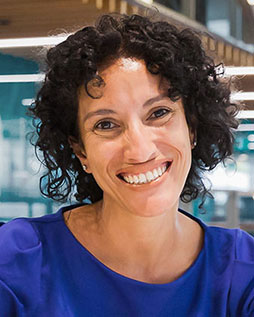
Saba Bebawi is a journalism and media researcher who has published on media power and the role of media in democracy-building, in addition to investigative journalism in conflict and post-conflict regions. She is author of Media Power and Global Television News: The role of Al Jazeera English (2016), Investigative Journalism in the Arab World: Issues and Challenges (2016), and co-author with Mark Evans on The Future Foreign Correspondent (2019), in addition to co-editor of Social Media and the Politics of Reportage:The ‘Arab Spring’ (2014). She holds a PhD in International News from the University of Melbourne, an MA research in Media Policy from Queensland University of Technology (QUT), and an MA in Communications from Monash University in Australia.
DJRG Fellow, March 2020
Bebawi has worked as a journalist since 1995. She was a broadcaster/producer for Radio Jordan English service for four years, and also worked on a contract basis for CNN, World New Events (USA), and Dubai TV. She is a media development and policy consultant, in addition to being a media trainer. She was a scholarly fellow at the Centre for Media Pluralism and Freedom at the European University Institute (EUI) in Florence, Italy (June-July 2017); and visiting fellow at the Middle East Institute (MEI) at the National University of Singapore (NUS), (July 2016). She is currently an Australian Research Council (ARC) DECRA fellow (2018-2020) for a project on ‘Developing an Arab Culture of Investigative Journalism’. She is also Chief Investigator of an ARC Discovery Project (2018-2020) with the University of Sydney and Helsinki, on a project titled ‘Media Pluralism and Online News’. She is project director for the Foreign Correspondent Study Tour (FCST), funded by the Australian government’s Department of Foreign Affairs and Trade (DFAT), and the New Colombo Plan (NCP) mobility grants.
Title and abstract
Understanding Data Journalism in Investigative Reporting in the Arab World
Data-driven journalism is still somewhat new in the Arab world, and despite some promising initiatives, there are a few obstacles that Arab journalism faces in this transitional period to data journalism. This presentation will discuss two of these challenges: the first is traditional practices of Arab reporting that can be described as emotive in nature, and the second is the lack of data and access to information. Nonetheless reporters, and particularly investigative journalists in the region, are working towards addressing these two challenges especially through the training of the next generation of journalists.
Interestingly, data journalism is being adopted by Arab investigative reporters with the aim of producing evidence-based reporting, and for that reason this presentation will focus specifically on that form of journalism.
The historic evolvement of investigative reporting has not been systematic in the Arab world, nor has it developed in a regular and routine form. In fact, its emergence can be better characterised as chaotic and dispersed, where its successes in achieving change and making an impact have been occasional. Therefore, the evolution of investigative journalism does not translate into a continuous historical narrative; rather, it can be described as a cyclical evolution that is dependent on particular circumstances and conditions that relate to the media institution; the journalist; and the political, economic, and social conditions at the time. In light of this, access to data remains a particular challenge to Arab investigative reporters, where archival material is limited. To add, in a region of high political activity and corruptive systems, providing access to information to citizens, including journalists, puts the government and officials in jeopardy; therefore, it is not within their interest to promote or facilitate any Freedom of Information (FOI) laws that facilitate access to information.
Yet Arab investigative reporters are finding ways of uncovering information and using data journalism to tell their stories, changing what used to be an ‘emotive’ form of Arab journalism, as will be discussed in this presentation, to that of a fact-finding and fact checking form of journalism. This study is part of a larger project that aims to understand how Arab investigative journalism is evolving independently of western journalistic models.
Selected publications
- Media Power and Global Television News: The Role of Al Jazeera, Saba Bebawi, I.B Tauris (2016)
- Investigative Journalism in the Arab World: Issues and Challenges, Saba Bebawi, Palgrave Studies in Communication for Social Change series edited by Pradip Thomas and Elske van de Fliert, Palgrave Macmillan (2015)
- Social Media and the Politics of Reportage: The Arab Spring, Saba Bebawi & Diana Bossio (Eds), Palgrave Macmillan (2014)
- The Digital Public Sphere: Social Media as Social and Political Participation, in Routledge Handbook of Media Literacy Education, eds. Belinha S. De Abreu, Paul Mihailidis, Alice Y. L. Lee, Jad Melki, Julian McDougall. Routledge: New York (2017)
- The Cultural Imperative: News Production and Soft Power, in Routledge Handbook of Soft Power, eds. Naren Chitty, Craig Hayden, Li Ji, Gary Rawnsley, John Simons. Routledge: London (2016)